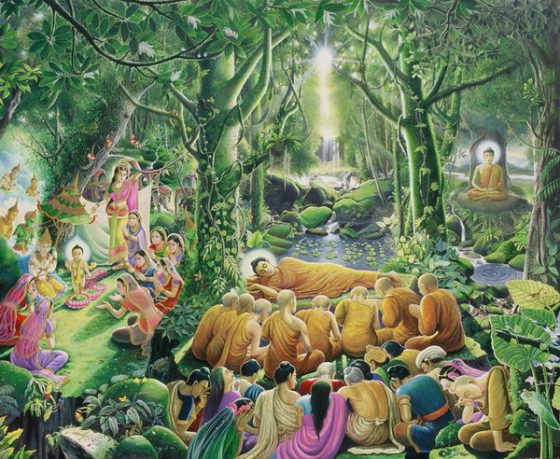WISDOM NOT SUPERSTITION
The Buddha rejects superstitions but urges us to pursue wisdom. The Buddha teaches us to develop the most important practices: self-discipline, self-restraint, cultivation of morality and spiritual development. The Buddha also teaches us to cultivate the strength of will-power, wisdom, understanding of Mind and self-nature.
IDEAL WORSHIP, NOT IDOL WORSHIP
Regarding as a way of cultivation, some people place the Buddhist images to worship. However, if they pray the images requesting for guidance and protection for health and wealth for good luck and fame, for power and love, etc, or if they ask favours from the images and figures to forgive their evil deeds, then they are not in the right path of cultivation.
The worship of the Buddhist images is to pay respects to the Buddha, the greatest, wisest, most benevolent, compassionate man who has ever lived in this world. The images help people to recall the Buddha in their mind. They may be used as a symbol or an object of concentration to gain a piece of mind. The serenity of the Buddhist images influences and inspires them to observe the right path of conduct and thought.
The recollection of the Buddha produces joy, invigorates the mind and elevates man from states of restlessness, tension and frustration. Thus, the worship of the Buddha is not a prayer in its usual sense, but a meditation. Therefore, it is not idol worship, but “ideal” worship.
On the other hand, respecting the Buddha images without following Buddha’s teaching is not the way of cultivation. All worshippers should endeavour to understand the spirit of the Buddha.
SPIRITUAL POWER, NOT MIRACULOUS POWER
In Buddhism, there are so-called Six Psychic Power, which can be attained through long and intense training in meditation. The Buddha has advised his disciples not to exercise such psychic power, such as walking on water, exorcising spirits, fortune-telling, etc. The people may be converted and attracted to a religion, not because they realize the truth, but because they harbour hallucinations. It is not appropriate. In Buddhism, miracles can hinder a person to attain enlightenment.
The Buddha says that a person can gain miraculous power without gaining spiritual power. However, it is dangerous because this power may be misused, and harmful to people. These so-called miracles are merely imaginations and hallucinations created by their own minds due to a lack of understanding of things as they truly are. The Buddha expressly forbade his disciples to use miracles to prove the superiority of his teachings. The Buddha teaches us to cultivate and gain the spiritual power, then we automatically have the psychic power too. The latter is the “side-product” of the former, but the Buddha advises us not to crave and cling to the psychic power, or any other responses in form. The change for the better arising from an understanding of Dharma.
Source: http://www.buddhistdoor.com
This post has been reshared 8 times on Google+
View this post on Google+









